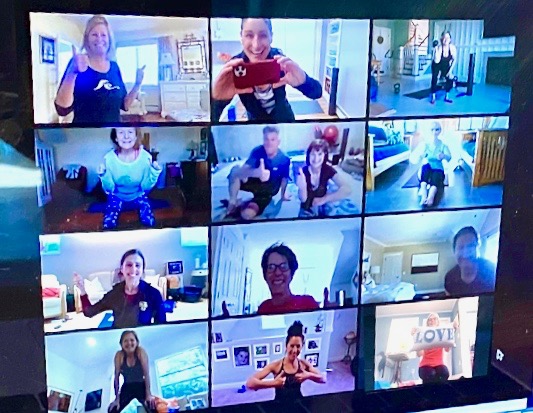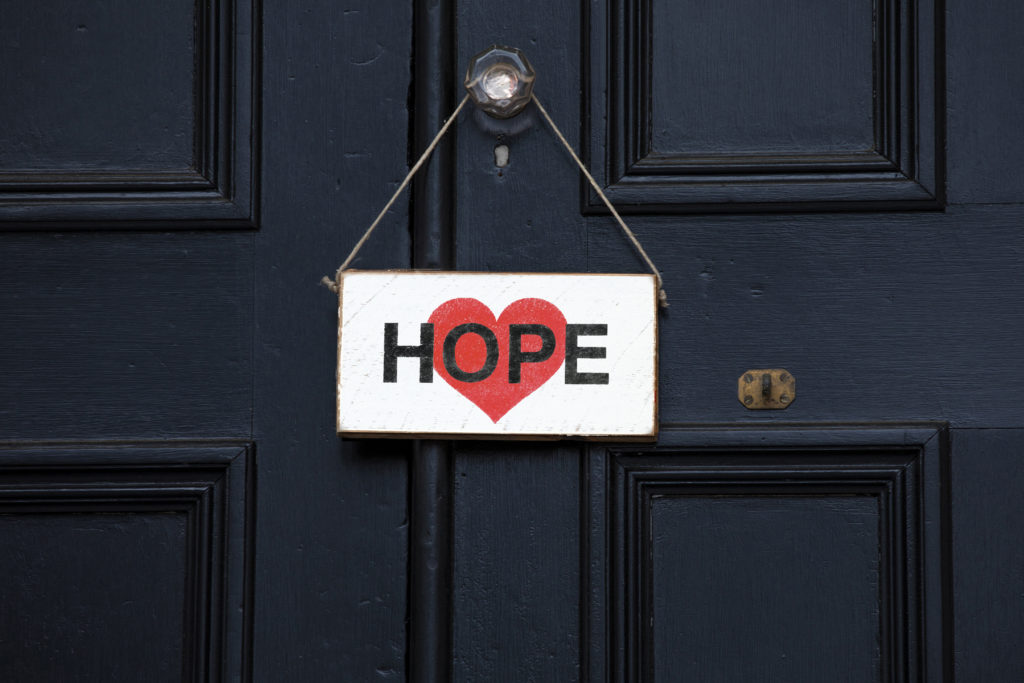It seems like so long ago when, as long as they had hand sanitizers available and limited the number of customers on the premises, most businesses were allowed to remain open as the first signs of the COVID-19 pandemic appeared.
By mid-March, Massachusetts had declared a State of Emergency and “non-essential” businesses were ordered to close and social distancing became the new normal, as government and health officials watched the virus spread from community to community. Layoffs have occurred in most sectors; some businesses have shifted their workforces to remote operations, if possible. Movie theaters, gyms and retail shops have had no option except to close. All businesses are bracing for financial losses and for some, bankruptcy is certain.
Some business owners, like Amy GiaQuinto, have been able to pivot.
“While the rest of the world was slowing down, overnight I completely revamped the way I have run my business for 17 years,” said GiaQuinto of Personalized Fitness Solutions, a small fitness studio in Harwich Port who started offering her classes online via Zoom. “I haven’t had one client cancel. It’s amazing! They have all been so incredible working with us to transition to this virtual way of training and taking classes.”
When she notified her clients that she would have to close temporarily, she was “inundated” with emails and calls.
“I knew I had to think fast and come up with a way to keep our community intact, help reduce the stress and anxiety I could feel so many battling and keep our clients moving and hopeful during this extremely surreal and stressful time in all of our lives,” she said. “I am a firm believer that life is ‘10 percent what happens to me, and 90 percent how I react to it’ (Charles Swindol),’ As I said to our clients ‘let us make lemonade.’ I have been blown away by the fabulous feedback we are receiving and so touched at how excited our clients are to ‘see’ each other during these very isolating times.”

When the pandemic began to ramp up, Lisa Guyon, executive director of the nonprofit WE CAN, also based in Harwich, knew the organization had to remain in touch with clients and had to make changes in its operations, which depends on face-to-face consultations.
“We’ve transitioned to a virtual platform to be able to continue to provide services without women having to come into our office,” said Guyon.
The organization receives more than 15,000 calls and walk-ins annually with nearly 2,800 individuals participating in their programs and services each year. WE CAN worked with the 118Group of Hyannis (parent of Cape & Plymouth Business) to implement the system.
WE CAN (www.wecancenter.org) moved its forms online and delivered consults via telephone or video conferencing, which also had the benefit of reducing turnaround time because clients and applicants will not have to print or scan the forms to initially reach the organization, and travel for both the volunteers and participants is eliminated.
Reinventing A Business Model
Promotional product company owner Rachel Leone of Hingham was in a panic when event after event she had worked on was canceled, including May’s Nantucket Wine Festival, a longtime client. The festival had required thousands of items carrying its logo, from wine glasses and koozies to event wristbands and towels, among other things. In addition, workforces from corporate clients were relegated to working remotely. Leone has provided promotion products to the banking, dental, financial, healthcare, insurance and real estate industries as well as to countless small businesses.
“I had to reinvent myself,” she said.
Her new strategy was to contact clients and suggest they send their work from home employees motivational gifts, such as blankets, pens and even hand sanitizer.
“Hand sanitizer saved me in March,” she said. “I’m not killing it, but I’m surviving.”
While she’s worked from home since starting Leone Marketing Solutions 17 years ago, Leone was often on the road at least two days a week to visit clients or potential customers, showing products in person, or to attend networking events.
“I’m now looking into making videos to show products, I think that’s the wave of the future,” she said.
Jitka Borowick, CEO and founder of Cleangreen, a Barnstable-based residential and commercial cleaning company, adapted her business strategy to minimize the impact of the pandemic on her staff, selling cleaning baskets and encouraging clients to purchase gift certificates and to schedule future cleanings.
“In times like this, you have to be flexible, adaptable, and quickly find ways for our current clients to continue supporting us,” Borowick said. “We’re still able to support our region’s essential businesses by ensuring their workplace is not only clean, but safe for them, their employees, and the customers they are serving during this time. We’re making every effort to do this while observing protocols defined by the Centers for Disease Control and Prevention.”
Cannabis Industry Finds New Purpose
Other sectors have looked into how they could tap into other markets needing their expertise. The huge demand for hand sanitizers created some unlikely bedfellows: the cannabis industry and healthcare.
The surging success of the cannabis industry was dealt a huge blow with the governor’s order mandating closure of recreational marijuana shops. Dispensaries were allowed to remain open but the loss of market cut deeply into the cannabis business.
While the ingredients in hand sanitizer aren’t expensive, the equipment used to make it is costly, but cannabis cultivators already had this key equipment for distilling cannabis concentrates. The Massachusetts Hospital Association brought together the Commonwealth Dispensary Association and directors of pharmacy from hospitals and health systems across the state to create protocols, standard operating procedures and to assist with production knowledge. The product is being donated free to hospitals.
“Because we can only produce product for our medical operations, we were happy to use some of our capacity to join with other members of the Commonwealth Dispensary Association to manufacture and donate hand sanitizer,” said Kevin O’Reilly, Chief Operating Officer of Triple M, which has a cultivation facility in Plymouth and dispensaries in Plymouth and Mashpee. “There is a desperate need for hand sanitizer across the state, and as a locally owned company, we hope we can help fill this void by using our production facility to assist local health care providers.”
O’Reilly was forced to furlough most of the company’s adult use recreational staff, due to the governor’s emergency order, although he hopes to have them all return once the order is lifted on May 4.
“In the meantime, we are already seeing an increase in the amount of people who have obtained their medical marijuana cards, now that the Cannabis Control Commission is allowing new patients to be certified at home by a registered healthcare professional through electronic/telehealth consultation (i.e. telephone or web),” O’Reilly noted.
Delivery Needs Create Growth
The changes in dining out and the need for delivery services have been a bonus to ROVA (http://rovahq.com), a Hingham-based business, which is on an online platform that connects independent contractor drivers with businesses seeking on-demand delivery services.
“One immediate impact we are noticing is an uptick in requests for food deliveries to customers from restaurants, because one of the provisions of the State of Emergency is that there is no ability for patrons to dine in at restaurants – only take-out and delivery options,” notes Tom McGrath, CEO of ROVA. “Another impact we have noted: we do a large number of deliveries for pharmacies to individual homes and nursing homes. One of the potential challenges in our industry is that a signature (or at least proof of delivery) is custom. Rather than have recipients sign to acknowledge receipt of product on a tablet that has been handled potentially by multiple parties, we have modified our protocol so that we take a photo of the delivered product with the recipient in the background. No signature required.”
Having A Plan In Place
The insurance company RogersGray (www.rogersgray.com), with nine offices located on the South Shore and Cape Cod, closed their offices to the public, except by appointment, but the company had a crisis management plan in place that allowed for a relatively smooth transition once the pandemic started affecting the community.
“Our team has a mix of people in the office and working remotely if they had any concerns,” said Lynn Mason-Small, senior vice president and chief marketing officer. “We did have a business continuity plan in place for this, so it was an almost seamless transition to move our teams to remote work while still balancing the service needs of our clients. Additionally, we’re about to launch a new chat, phone and video call service option for clients as well. This will help keep us connected and servicing the clients in real time vs. just emailing, etc.”
The RogersGray team also uses Zoom, Instant Messenger and other technologies to stay connected internally.
Eying Future Business
Dennis J. Swart is founder/president of DJSA Architecture, located in Raynham. A large part of the 15-year old firm’s business is design in the hospitality space, which because of the recent State of Emergency has presented some unique challenges. The firm recently completed the design work for a Cape Cod hotel, but a couple of large projects have been delayed while management watches the unfolding coronavirus situation.
“Hotels have very few guests, restaurants are only serving takeout, and that poses challenges not only for what we do, but of course for the people who own the properties,” Swart said.
To adjust for this slowdown, DJSA is also pursuing design work in other fields that may be less affected by the current situation. But they are also working with their hospitality clients to help do what they can in the present so that they will be ready to fully engage when the immediate crisis has passed. A big part of their referral base comes from construction firms so they are also using the time to stay in close contact with these firms.
On a practical level, they are gearing up so that their staff — design and others — can work remotely. “Technology being what it is, it’s easier to work remotely than it would have been 10 or 15 years ago. We can still get our work done and be cognizant of the social distancing that’s becoming more prevalent.”
Helping Hands
The altruistic side of business owners has been evident since the pandemic began.
Home decor company Rustic Marlin of Hanover launched a “Signs of Hope” initiative, donating 100 percent of the profits to the Rustic Marlin team as well as employees of other small businesses who have been recently impacted by COVID-19.

Signs of Hope is a line of products based on the themes of hope, humor and Americana. The Rustic Marlin team designed some signage addressing the uncertainty people are feeling and as a way to show support for first responders. The signs include hearts with the words “hope” or “hero” or “Faith Over Fear” in the center.
“The idea is to use the profits to assist ordinary people that just a few weeks ago had jobs within a small business but now their world has been turned upside down because the company they work at had to close,” said co-founder Brian O’Neil. “These employees are the lifeline of small businesses and we know this all too well. We are trying to maximize the monies generated and our goal is to buy gift cards at local restaurants and donate to employees to feed their family. We believe this is the best way to support as many small businesses as we can at one time.”
Rustic Marlin has been exploring ways it could potentially use its large manufacturing facility to help build extremely needed products such as hand sanitizers or protective garments.
Rock Harbor Grill, located at 18 Old Colony Way in Orleans, launched Team Tuesdays, giving 100 percent of their nightly revenue on Tuesdays to its staff. Since Governor Baker’s announcement that restaurants could only provide takeout food, most of the Grill’s staff of 50 was laid off or have very limited hours. The first Team Tuesday was held March 17 and was a huge success, according to owners Chuck and Meredith Konner.
“I couldn’t believe the amount of people that came out and donated. I was astounded by the generosity of our community and how they care for our staff,” said Chuck. “People are good in times of need.”
Jewelry designer Tiffany Narbonne, owner of T. Jazelle, created a special edition bracelet to raise funds for Global Giving’s Coronavirus Relief Fund.
The T. Jazelle’s Relief Bracelet was released March 20 and $5 from the sales of every bracelet will be donated the fund. After a week, Narbonne had raised $2,000 for the fund.


“Our Give Back collection has been a staple in my company’s collections and in the past we’ve worked with organizations such as the Humane Society of the United States, National Research Center for Cancer and the Mass General Marathon Team Fighting Kids Cancer. With all that I have witnessed over the last few weeks, I knew I had to help in some way,” said Narbonne.
Guy Fieri, host of The Food Network’s “Diners, Drive-ins and Dives” is leading a nationwide fund-raising drive for the recently established Restaurant Employee Relief Fund via a Restaurant Relief America campaign.
The (NRAEF) announced March 27 the creation of a Restaurant Employee Relief Fund to support U.S. restaurant workers financially impacted by the COVID-19 crisis. One hundred percent of all donations will go directly to restaurant workers in need. As of April 2, impacted restaurant workers were able to apply online for a one-time, $500 check to use towards housing, transportation, utilities, child-care, groceries, medical bills and/or student loans. These grants will be administered by the NRAEF and offered on a first-come, first-served basis. For more information on donating to RERF visit https://rerf.us/
Founding Partners of the fund include PepsiCo, Uber Eats, Constellation Brands, Moët Hennessy USA, Ecolab, Cargill, Boston Beer Company, Shift4 Payments, P&G Professional, The Elliot Group, Davis Wright Tremaine LLP, and the Light Foundation.
The Arts Foundation of Cape Cod is stepping up to assist the arts community on Cape Cod by launching the Cape Cod Arts Relief Fund.
“Our creative community is potentially facing devastating impacts as a result of the economic fallout from this pandemic. This fund will address that urgent need,” said AFCC Executive Director Julie Wake. “As the Cape’s regional arts nonprofit, we have an obligation to ensure that these impacts are minimized so our local artists can continue making art when this is over.”
The AFCC has already raised more than $10,000 for the fund and has set a fund-raising goal of another $20,000 by May 1st. Funders include artist and teacher Pete Hocking of Provincetown, Terrence Meck and The Palette Fund, RogersGray, and the AFCC Board of Directors.
Applications to the Cape Cod Arts Relief Fund will be available starting April 1st, at www.artsfoundation.org. One-time relief funds of up to $500 per individual artist will be distributed beginning in late April. Applicants must be artists who live, work, create, and/or perform on Cape Cod and have been financially impacted as a result of the pandemic.
A second phase of this effort will focus on cultural nonprofits and ways the AFCC can support them once the pandemic is over.
AFCC Board Chair Kathryn Kayajan highlighted the importance of the arts as a major economic driver to our region.
“The arts create jobs, attract tourists, and draw much-needed revenue to the Cape’s year-round economy,” she said. “Now is the time to support our artists who bring us so much joy, not just during good times, but difficult ones like we’re currently facing. We also need to stand by our cultural nonprofits and their employees who bring us world-class exhibits, plays, concerts, poetry readings, lectures, and more that inspire us, enrich our lives, and give it meaning.”
The AFCC is seeking business partners as well as donors to meet its fundraising goal in order to help as many artists and nonprofits as possible. Those interested in donating should contact Julie Wake at jwake@artsfoundation.org.
The shortage of protective masks are keeping sewers busy for Tuff Kookooshka The company, based in East Falmouth, makes one of a kind children’s clothing from a sewing room in Cataumet and sells mainly through large juried arts and crafts shows in the northeast and its website (https://kookooshka.com/).
“Our spring shows have all been canceled or postponed and our studio shop (at Mashpee Commons) is closed,” said Brian Gonye. “ We started making masks as a way to help friends and in the healthcare profession and then it has taken off from there, once people found out that we are making them.”
More To Come
With the governor’s non-essential business closure extended to May 4 and the stay-at-home advisory remaining in effect, April is going to test the business community and our personal resolve.
“I am doing my best to find as many silver linings as possible,” says Personalized Fitness Solutions’ Amy GiaQuinto. “We will all get through this together. We rise by lifting each other, and we must find ways figuratively to do just that while keeping ourselves safe. It’s not about the glass being half full or empty, it’s about being thankful for the glass. No storm has ever lasted forever; the sun always comes out again.”


























